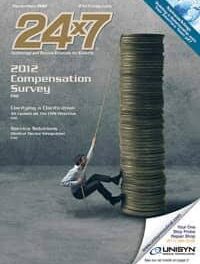Salaries vary by region amid surging inflation
By Keri Forsythe-Stephens
Editor’s note: The January/February 2022 print issue will feature exclusive salary charts and regional break-downs.
The good news first: In 24×7‘s HTM Salary Survey, Median salaries grew nationwide in four major job categories—BMET 1, BMET2, BMET3, and director/executive—in 2021, with BMET 2s seeing the largest, year-over-year, gains. (In 2020, the median national salary for BMET 2s was $61,000; in 2021, it rose to $67,300). Unfortunately, that’s where the good news ends.
Despite record-high inflation—consumer prices jumped 7% in 2021, the sharpest increase since 1982—wages in the healthcare technology management (HTM) field largely lagged. National median salaries for clinical engineers and radiology equipment specialists dipped slightly in 2021, transitioning from $89,700 to $89,200 and $88,500 to $88,300, year-over-year, respectively. Managers’ wallets were hit hardest in 2021, however, with their salaries slipping from $103,300 to $99,800, year-over-year.
But if the results gleaned from 24×7’s HTM Salary Survey are any indication, one thing’s for certain: All U.S. regions are not created alike.
A Southern Boom?
Geographically speaking, HTM salaries in certain areas—particularly New England, the Middle Atlantic, East North Central, and West North Central—fell in three or more of the seven job categories, with the latter region seeing the most dramatic declines. (Salaries in the West North Central fell in five of seven job categories; only BMET 3s and directors/executives saw gains in 2021.)
Such statistics are in stark contrast to the salary growth witnessed throughout the South. Unlike their neighbors to the north, HTM professionals in the West South Central recorded strong financial growth in 2021, with their salaries increasing in all seven job categories. (Radiology equipment specialists benefited most in 2021, however, with their salaries surging from $76,300 to $86,200, year-over-year.)
Radiology equipment specialists in the East South Central also fared well in 2021—very well. In 2020, the median salary for these professionals stood solidly at $84,500; in 2021, it rose to $96,100. Only their Mountain West-based radiology equipment specialist peers saw stronger year-over-year gains, with their salaries surging from $75,800 to $95,000 in 2021. Suffice it to say that radiology equipment specialists in the West North Central weren’t as lucky. Despite an influx of imaging procedures—due, in large part, to the COVID-19 pandemic and the resultant reliance on radiology equipment—professionals in this region saw their salaries decline from $88,300 to $82,500, year-over-year, in 2021.
“Even after being trained in radiology, my salary is still lower than average for an imaging engineer,” one survey respondent lamented, “even though we are constantly looking for more engineers and have high turnover [at my facility.]”
It appears that this problem isn’t isolated. “Our facility has a hard time keeping imaging equipment specialists because our pay is not competitive,” another respondent wrote. “They always go someplace that pays significantly higher after acquiring some experience.”
HTM Insights
A lack of upward mobility is something many respondents noted in 24×7’s HTM Salary Survey, with 43% characterizing their chances for promotion as “poor” or “fairly poor.” Only 11% marked their chances as “excellent,” while a subsequent 17% dubbed it “very good.” The most common answer? “About average.”
Despite mixed reviews concerning their prospects of promotion, survey respondents were rather complacent in their roles. Nearly three-quarters—73%, to be exact—said they weren’t currently looking for a new job outside of their organization. Of the 27% that are currently job-searching, some of their biggest complaints about the field include a general lack of awareness about its existence, manufacturer-related repair restrictions, and the aging workforce.
Addressing the latter two grievances, one respondent wrote: “In the field, the ability to service equipment is increasingly being locked behind OEM proprietary service keys, and access to service/technical documentation is becoming increasingly scarce.” Plus, the respondent said, “The high age of HTM professionals is going to lead to an inability to fill key positions when these professionals retire, which will lead to increased equipment downtime at facilities.”
A bleak picture, indeed, but there are signs that the situation is improving. In 2020’s compensation and job satisfaction survey, the average age among respondents was 49.5 years, a figure in line with 2019 and 2018’s average age of 49. But in 2021, the age of the average respondent fell to 47. Still, less than one-third—30%—of respondents were under age 40, with nearly half—a hefty 46%—over 50.
Mild age improvements aside, one thing that hasn’t changed is the number of women in the field. Women accounted for 11% of survey respondents in 2021, consistent with 2020 statistics. Also consistent with 2020 statistics: the number of respondents who deemed their workload as “heavy” or “excessive.” In 2021, 85% of those surveyed used such adjectives to describe their workload, nearly identical to 2020, in which 86% did so. Both years, only a miniscule number—2%—characterized their workload as “light.”
“I’m constantly behind on tasks and overwhelmed,” one survey respondent wrote, with another noting how the pandemic exasperated their workload. “Equipment is moving around a lot and is being maxed out [due to COVID-19],” the individual remarked.
But this busyness—attributable to the pandemic or otherwise—doesn’t seem to impact HTM professionals’ outlook on the field. A solid 71% of survey respondents said they were either “likely” or “very likely” to recommend the profession to others. Only 4% of respondents revealed that they were “very unlikely” to do so, with a further 6% deeming themselves “somewhat unlikely.”
HTM: A Rewarding Field
When asked to name their favorite aspects of the HTM field, respondents cited a variety of benefits. The challenges of working in a fast-paced healthcare environment was a popular answer, as was the patient care implications of HTM. One survey respondent called the profession a “hidden gem,” with another lauding the autonomy it affords. “I get bored quickly, and this has kept me going for the last 14.5 years,” yet another respondent wrote.
“It’s a good field to get into if you are technology-inclined, want to help people, and constantly learn,” one individual said. Another quipped: “In my opinion, this profession remains one of the most rewarding—maybe not in pay, which has taken over what the younger generation wants or thinks they deserve. The best is working for and alongside professionals who are committed to helping people get better. I love that about this job.”
Other aspects HTM professionals love? “I can effect change, manage my own projects, and drive decision-making within my organization. I have opportunities to advance and grow personally, and my leaders and coworkers are supportive,” one survey respondent wrote.
Benefit-wise, survey respondents also praised the various allowances provided by their employers. Nearly all of those surveyed—96%—get paid time off, with 92% and 89% receiving 401(K) reimbursement and life insurance, respectively. More than half—58%—of respondents revealed that they’re employers subsidize professional development activities and 68% are reimbursed for tuition. Moreover, exactly half of survey respondents earned $3,000 or less in bonuses or other cash compensation in 2021, with more than one-fifth netting $10,000 or more.
It’s yet another financial discrepancy in a year that’s been fraught with them. But despite the salary inconsistencies seen between U.S. regions in 24×7’s HTM Salary Survey, healthcare technology management continues to be a valued field that is indispensable to patient care, survey respondents said. And, they hope, it will finally get the respect it deserves.
Keri Forsythe-Stephens is chief editor of 24×7 Magazine. Questions and comments can be directed to [email protected].






Years ago, this magazine gave very targeted pay scales in regards to Biomed specialties. I recently hired an Anesthesia machine specialist and need some data to back me going to HR to adjust his pay to accurately match the market. I was hoping to get that info from this article. If you have this info, I would greatly appreciate e-mailing it to me. Thankyou.. Tom C
Hi Tom, I will peruse the data and try to find this. What region are you in?
I too was looking forward to median and salary ranges for each position, for each region.
Yes, the January/February print issue will have all of the salary charts by region.
When will the issue ship?
It should be there very shortly. In the meantime, please flip to page 8 on our digital edition: http://digitaledition.24x7mag.com/x7mag/diged/20220102/index.html